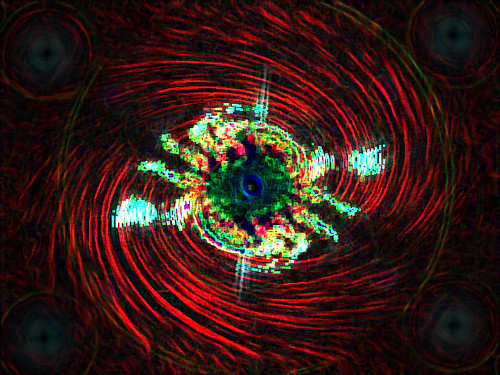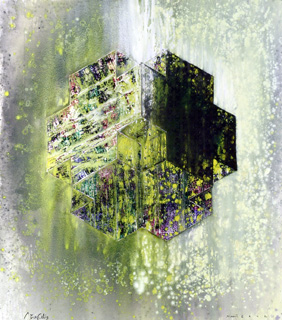
Do-it-yourself psychical research has taken on major proportions.
It's easy to see why. The few university parapsychology departments are in a rut. Anxious about keeping what little academic respectability and funding they have, they kneel before the altar of experimental repeatability, the essence of scientific method. Unfortunately, by far the greatest number of paranormal events seem to happen spontaneously, or if they are somehow induced, can't be repeated at will. So respectable parapsychologists are pretty much locked into a routine of testing subjects for telepathy and psychokinesis, which give results that can be calculated to see if they score above chance at a statistically significant level.
The trouble is, telepathy and PK have long since been demonstrated scientifically. And while there is still something to learn about the factors involved, this play-it-safe research isn't advancing the field in a way that provides new answers to age-old metaphysical questions, or captures the imagination.
Long-established private organizations are in a bind as well. I'm a member of the Society for Psychical Research, which has a distinguished history, puts on splendid annual conferences, and continues to publish the important Journal of the Society for Psychical Research. But the Society lacks the funding to support very much independent research on its own, so it has to rely on reports by university departments or invididual members.
Thus, the institutional basis for psychical research presents a discouraging picture at the moment, at least concerning questions that interest non-specialists the most: for instance, the nature of apparitions ("ghosts"), hauntings, poltergeist phenomena, and the survival of the individual's consciousness following the death of the physical body. The more official and respectable researchers either reduce such issues to abnormal psychology or throw in the sponge and declare that these phenomena can't be studied scientifically because they won't dutifully present themselves in the laboratory.
But people -- including some of the most intelligent and curious -- still want to know more about the meaning of events that seem to defy ordinary physical laws. And above all, what can we expect when the black camel kneels at our tent? The quest for answers to the enigma of post-mortem survival will not be stopped.
So in a time when electronics permeates daily life as never before, and people are (practically of necessity) getting sophisticated about technological gadgets, it's no surprise that more and more individuals and groups are using modern recording devices to find and preserve evidence of paranormal events and communication. These individuals are amateurs in the original and positive sense of the word, those who study a field for the love of it, not for something to put on their résumés.
There are two main categories of do-it-yourselfers: "ghost hunters" and EVP (electronic voice phenomena) recorders. No doubt there is some crossover among these forms.
Professional parapsychologists and those who have to be one step up from anything popular can object that these uncertified practitioners aren't qualified by background and training, don't have the intellectual discipline that it takes, and so on. But many do-it-yourself psychical researchers appear to have scientific and technical backgrounds, and to make use of advanced software applications in their investigations into the mysteries of life and death.
In some cases, though, the criticisms may be true. Try Googling "ghost hunting" and you'll turn up a startling number of web sites of local ghost-chasing societies. Too many of them don't seem serious-minded -- they're illustrated with comic-book imagery of ghosts and tell their story in language that resembles advertisements for tours of haunted places. Some sites appear to be primarily geared to sales of everything from electromagnetic sensors (a legitimate tool of the trade) to New Age paraphernalia to T-shirts with spooky messages.
I've no doubt that there are ghost hunters who pursue knowledge for its own sake, or for the sake of their personal and spiritual development. As in all aspects of the occult, the jokers tend to give the whole pack a bad vibe.

EVP enthusiasts work from an even more astounding thesis: that disembodied spirits -- either people who have passed through the gate called death, or permanently non-physical entities -- can be heard speaking on ordinary recording media. Although there are computer programs designed to improve the signal-to-noise ratio and otherwise "clean up" the paranormal recordings, it is said that with no special equipment other than a tape recorder anyone can hear the voices once they get used to some peculiarities of the sound and inflections of the voices.
If this can be demonstrated -- and hundreds of apparently perfectly sane people say they are demonstrating it, repeatedly -- EVP could be the Holy Grail that psychical research has always dreamed of, so-called permanent paranormal objects. That is, phenomena that may be borderline spontaneous but of which a permanent record can be kept.
I make no claims about the validity of EVP, not having done any experiments myself. (And often in this field, even when you have the evidence, it's debatable how to interpret it.) But it seems to me a very promising technology.
Moreover, I recently became acquainted with an organization whose integrity I'm inclined to trust on the basis of my judgment and intuition. It is the American Association of Electronic Voice Phenomena (AA-EVP), founded in 1982 by Sarah Estep and now directed by Tom and Lisa Butler. The web site includes detailed instructions for people who want to try the techniques for themselves and sound file samples of EVP. AA-EVP is presenting a conference next June titled "Life After Death: The Evidence" with an impressive lineup of speakers, including Gary Schwartz, whom I met when I lived in Tucson where he is based, and who has been published (to considerable controversy) in the SPR Journal. I see that another speaker, Alexander MacRae, has also been published by the SPR.
The first book on psychical research that came my way, some 40 years ago, and perhaps sparked a fascination that has never dimmed for me, was written by two psychical researchers of an earlier generation, Eric Dingwall and John Langdon-Davies. The title of their book asked: "The Unknown -- Is It Nearer?" Yes. I think it is.

2 comments:
Rick,
Well written comments. I believe you have correctly pointed out some of the problems researchers of “fringe” etheric to physical phenomena face.
I would like to make a couple of points to highlight your comments. First, the evidence being gathered in EVP and Instrumental TransCommunication (EVP + other forms of instrumental communication) is leading us to the conclusion that predictions of the Survival Hypothesis are essentially supported by evidence. There is an aspect of us that survives physical death and there is a place or aspect of reality in which we survive. As I see it, one reason mainstream parapsychology is so hesitant to review the evidence is that their root is in psychology and that field of research requires a biological origin of consciousness. Anything etheric is simply not allowed. Until it is, there will be no serious consideration of the evidence.
A second problem is that no one in the world is currently qualified to discuss the evidence of EVP and ITC based on the authority of a college education. For anyone to say that we should believe them because of their degree when they tell us that EVP is one way or another is simply a misrepresentation.
We have spent entirely too much time trying to undo damage caused by scientists making pronouncements about EVP when they are simply not qualified to do so.
Tom
Tom,
I fully agree.
Post a Comment